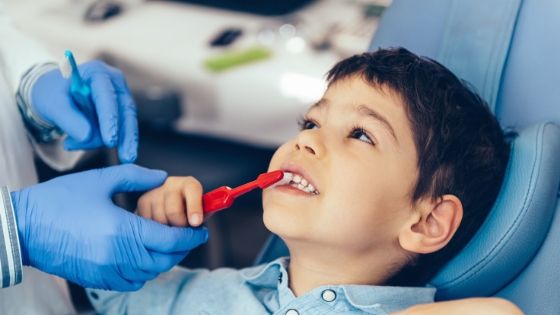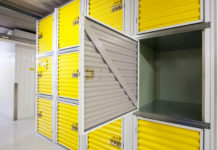Dental care for your children is essential to keep you child’s mouth healthy and free from infections and tooth decay. The importance of this cannot be underestimated. Surprisingly, tooth decay in preschoolers and primary school age children is one of the most common causes for hospitalization, so it makes practical good sense to start a good oral hygiene routine as early as possible in your child’s life. With orthodontics, you can get more than just a straighter smile; you can also improve your overall oral health and function.
Dental health care starts from birth; clean gums and teeth will prevent problems with pain and damage to adult teeth as they grow. Casey Dentists Townsville advise that there are easy steps you can take to protect your child’s teeth and teach them good habits for life. Regular oral care will help protect your child from infections, tooth decay and pain.
Dental check ups are an essential part of your child’s oral care, and regular visits to the dentist will help your child to understand dental care and avoid the fear that most of us have about going to the dentist.
To start you off on the road to healthy teeth and gums for your child, we have put together a list of 7 Dental Care Tips for Children which will guide you towards confident oral health care for you and your child.
1. Oral Hygiene – Start Early
Good oral hygiene for your child starts from around 4 to 8 months of age. Wiping your baby’s gums after each feed with a clean wet soft cloth or gauze pad will clean your baby’s mouth from any sugary residue from milk, keeping your baby’s mouth fresh and clean and avoiding decay.
Tooth brushing can be introduced as soon as your baby’s first tooth appears. Use a soft baby toothbrush and a small amount of water. This will introduce your baby to good oral hygiene which will become a normal part of your child’s daily life before they even realize it! Toothpaste is too strong for babies and should not be used until your child is old enough to spit it out.
When your child is old enough to learn to brush their own teeth, make it a fun exercise, and show him/her how to brush their teeth, how to floss and to rinse with water after brushing.
Replace toothbrushes or brush heads every 3 months and use children’s low-fluoride toothpaste.
Tooth brushing for primary school aged children should be supervised to ensure that proper brushing takes place, and there is no swallowing of toothpaste. Teeth should be brushed for a least two minutes. It is important that this becomes a fun activity with a ‘feel good’ feeling afterwards to encourage regular good oral habits.
2. Regular Dental Check ups
Regular dental checkups can begin from within 6 months of the first tooth appearing, often around the age of 1 year. Dental checkups ensure that any problems are spotted and treated early.
The dentist checks the health of your child’s teeth and gums, clean away any tartar build up and will take regular x-rays (when appropriate) so that any underlying problems can be fixed or prevented from developing further.
Your dentist will also check that your child’s teeth are coming through correctly, apply fissure sealants to the molars, if necessary, to reduce the risk of decay, and can assess if any orthodontic procedures may be appropriate for your child.
A visit to the dentist reinforces the importance of good mouthcare habits, and your dentist can help educate and demonstrate good techniques for brushing and flossing for your children to follow. A good relationship between your child and the dentist encourages them to maintain good oral hygiene habits for life.
3. Good Nutrition
Good nutrition for the health of you and your child’s teeth and gums cannot be emphasized enough. A well-balanced diet ensures that the body gets the required nutrients needed for good health and wellness.
Healthy eating habits and food choices are important factors in preventing tooth decay developing in young children and teens. Particular attention should be paid to foods and drinks containing calcium and phosphorous to aid in the strengthening the teeth, making them more resistant to decay.
A balanced diet that includes foods from the five main food groups ensures correct nutrition, snacks should be limited between meals and preferably be low in sugar, such as raw vegetables, cheese, yoghurt of fruit.
4. Limit Sugars
Food and drinks which are high in sugar cause tooth decay. Soft drinks, cordials and fruit juices should be avoided if possible, along with sweets, cakes, muffins, doughnuts, muesli bars and biscuits.
You cannot always ensure that your child will not consume sweet foods or drinks but teaching them to drink plain water before and after will help to wash away any food particles and residue sugars left in the mouth and reduce the effects of acid build-up.
5. Drink More Water
Encourage your child to drink water on a regular basis during the day to keep them hydrated and to reduce the risk of tooth decay. Water is the best drink for children and adults of all ages, especially if taking part in sports or exercise of any kind.
Sports drinks for children should be discouraged as they contain sugar and are acidic, which can lead to dental erosion.
6. Prevention is better than Cure
Sports and activity for children is vital for maintaining good fitness and health. When playing sport where there is a risk of injury, a mouthguard should be worn.
A custom-made mouthguard is the best protection for your child’s teeth, this can be replaced as your child grows or if there are changes in the mouth, such as when adult teeth start coming through.
Take the mouthguard when your child goes for a regular dental checkup, to ensure that is still fitting well and appropriate for your child’s mouth.
Along with a mouthguard, a broad spectrum SPF30+ sunscreen should be applied outdoors, and when playing sport, to reduce the risk of burning and lip cancers. This habit, when started early becomes part of your child’s lifetime health regime.
7. First Aid
Knowing what to do in dental emergency can reduce the risk of permanent damage to the injured party.
If your child has knocked out a baby tooth, don’t try to put it back in place, this can cause further damage to the gum and/or any adult tooth coming up underneath the gum.
If an adult tooth has been knocked out, avoid touching the root of the tooth and gently rinse the tooth with saline or milk to clean it. Do not rub the tooth.
In some cases, with older children, you can gently place the tooth (after cleaning) back into the socket and ask the child to gently bite on a clean cloth to help hold the tooth in place until an oral health professional can be seen.
Put your dentist’s number, or a dental emergency number, into your phone. Immediate treatment with an oral health professional is important if a tooth has been knocked out or broken as the risk for infection and permanent damage is high.
Knowing what to do in a dental emergency greatly calms and reassures the patient and reduces stress.




















